LineADucks

Ohara Koson: Two Mallard Ducks and the Moon (Early 20th century)
"Faith is not unsupported belief but the belief in uncanny experience …"
I recognize that Our Grand Refurbish has elbowed its way into perhaps more stories than warranted or wanted through this series. In explanation if not apology, Our Grand Refurbish has subsumed most of my foreground and background focus for many months. I've recently been bemoaning absences, primarily of closure, for this party's extended beyond celebration and nudged into a wicked form of self-punishment. What began with enthusiasm, albeit naive, evolved into frustration as the end game refused to coherently line up. Each attempt to decisively end the effort found only a fresh barrier preventing further forward movement. Reliable suppliers failed us. Sick days stalled us. Weather drove us inside. We could see what still needed doing but we could not quite manage to get there from here. I knew that something important was missing but I could not clearly state what that something might have been. That absence was not prescriptive.
I recognize that this was always how endings emerge but I'd somehow lost accessibility to that knowledge.
RushTheExit

Ohara Koson: Geese and the Moon (Early 20th century)
"Hasten home slowly. This ending's just begun."
I suspect a cultural imperative if not an innate human tendency at work, the one encouraging people who paid fifty bucks a ticket to leave the game in the middle of the seventh inning to, as they might claim, "beat the traffic." One might beat the traffic better by lingering until well after the game ends, until the parking lot's emptier, but that tactic seems to violate that imperative or tendency. Even at big games and popular concerts, where tickets cost hundreds, even thousands of dollars, one sees some percentage of the audience RushTheExit before the event even ends. We might become lemmings, ready to follow others' leads to our own demise whenever an ending threatens. The end will come but we seem to want our endings on our own terms and so we rush them. Our Grand Refurbish has been threatening to end for a fortnight now, but once it started throwing off serious intimations, progress stalled. Joel Our Carpenter came down with something that kept him off the job for a week after supply issues added a few days to our imaginary timeline, both conspiring to add tension to the conclusion. What operated as a relatively care free enterprise for months has become a pain in the butt to live with and I feel more than ready to simply wash my hands of whatever's left. I ache for doneness.
Such conditions might breed disaster, for they erode the patience which has thus far fueled our forward progress.
Pastiche

Das Leben ist schön: sculpture by "Leonardo Rossi", a fake name often used for plagiarized bronzes
" … respectfully mimicking itself in mom jeans."
As a lifelong member of the once highly-touted Baby Boomer generation, I regret to report that I'm apparently no longer a member of any demographic any retailer cares about. That mantle has passed to those who came of age after us. I'm wise to shop for clothes in vintage consignment shops. Few people now write books with my sensibilities in mind. Food has swerved toward both the bio-deplorable and the chemically-enhanced. I swear someone wants caffeine added to everything so they can call the result an energy source, that and bull pee, which has seeped into more than just the terribly regrettable Red Bull®, more an addiction than a beverage. Members of the generation just behind me are struggling to kick habits nobody had even invented yet when I was in my prime. Finding halfway decent jeans that fit without looking like they were tailored for mom has become essentially impossible. A tee shirt without either a brand name or some meaningless meme printed all over it might no longer exist. Do they even make clothes in innocuous colors anymore?
We have become a Pastiche society, one dedicated to emulating rather than creating, copying rather than originating.
Hinges&Doors
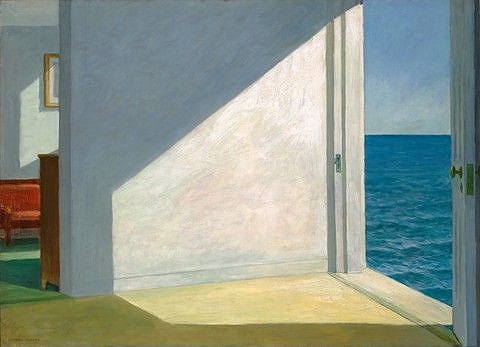
Edward Hopper: Rooms by the Sea (1951)
" … blind man coping as the pinnacle of engaging."
Our Grand Refurbish has depended upon many contributions. Our workers, who serve more as artisans, and whom we have fairly compensated, still contributed their non-refundable time to help us realize our fuzzy intentions. They gave away their care and attention. Reassembling the place after transformation depends upon tiny things, most prominently, Hinges&Doors. The doors, dedicated readers will recall, filled my playbook during the early to middle Refurbishment periods. I scraped and sanded each face before repainting it. They seemed finished works of art then, merely needing hanging, until hanging proved to be the most difficult part of the operation, with no merely in it. Hinges, you see, complicate everything. Hanging a door on its hinges becomes a two-man operation, with a third hand handy, involving grunting, hammering, and cursing. A few doors slip right onto their anchors, but most require a little adjustment, a little manual reasoning before they'll fit. Once mounted, the door might not quite sit squarely within its frame and require further hinge adjustment or a little frenzied sanding or planing along its top or leading edges. It seems wondrous when any of them work. I hold lingering doubts that all of them ever will.
One disassembles and one takes chances that something might not so seamlessly reassemble again.
NormalImpossible
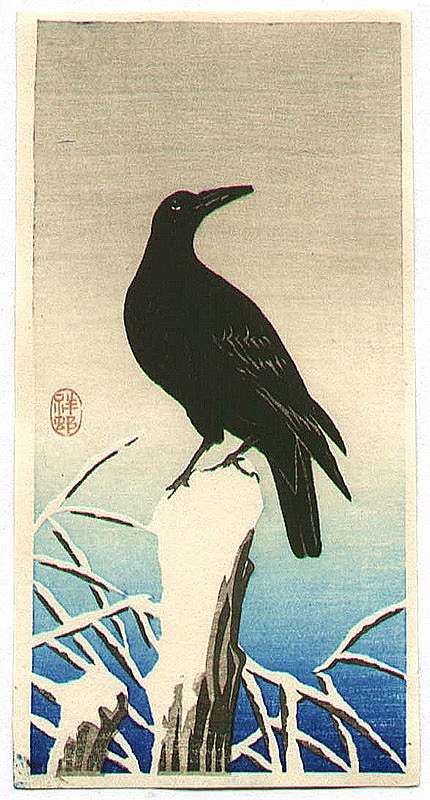
Ohara Koson: A Crow on a Snow Covered Tree Stump (circa 1930s)
" … that sense that you're on the verge of being found out to be a fraud and mustered out of the club."
I so routinely engage in impossibilities that they hardly register anymore. Much of what I initiate might beforehand be much more easily proven impossible than likely, yet I proceed, often in sublime ignorance of the utter impossibility I'm initiating. I've usually convinced myself that I'm starting something rather normal, and I often am, but NormalImpossible, not any of the infinite other varieties of normal available. We might benefit from a quick declaration of definition here so that we might share a common meaning, if that's even possible. I declare the NormalImpossible to feature so much exploding variance as to render it finitely unplannable, untrackable, and uncontrollable. An exploding variance shifts due to more than a few [let's say, three] influences, moves unexpectedly or stealthily, and contains many mutually distracting moving parts. To focus upon any part of a NormalImpossibility is to render the observer essentially blind to the rest of the mechanism, producing a blind observer effect where one observer proves insufficient and more than one cannot agree upon what they've seen, producing a Blind Men and the Elephant situation, all perfectly normal in my experience engaging in NormalImpossibles.
One of the more prominent features of the NormalImpossible situation has always been the apparently normal human tendency to perceive them as much simpler than one could possibly prove to be.
Evocations

Ohara Koson: Autumn Grass (1900-30)
"My feelings live close to the surface here …"
The Villa smells of pumpkin custard this early morning because The Muse was baking Thanksgiving pies last night. A pecan job rests beside the pumpkin on the kitchen counter. A extremely large-breasted turkey rests, air-drying in the garage refrigerator. A low ceiling hangs over this valley. A crane-shaped airplane, the morning flight to Seattle, just roared overhead. I suspect that it was filled with people heading off to spend this holiday with family, though I don't know that for a fact. I know little for a fact, though I seem to sense plenty and make sense that way. I mostly make meaning not by knowing but by feeling. I read Evocations emanating from things and those vibes serve to inform me. Were it not for this sensory capacity, I would seem just as ignorant as I truly am. It's not a sixth sense, either, but the judicious application of the first five.
This town evokes memories from me. It plays me like a cheap guitar.
FallingsForward
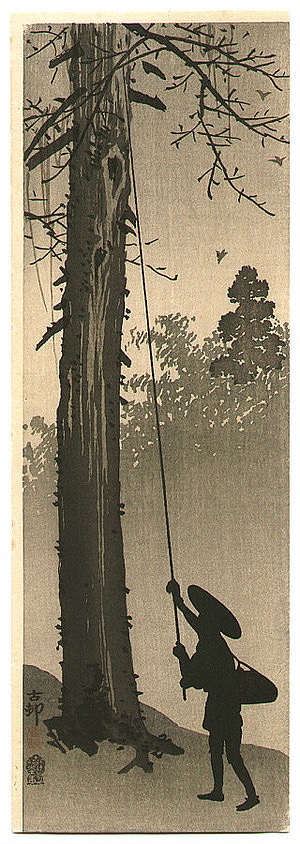
Ohara Koson: Hunting for Insects (1900-10)
"All progress seems to come from FallingsForward."
Years ago, a client asked me to review a project management course book he'd hired a BIG three consultant to create for his firm. The manual began by recounting many "failed" projects, adopting a backdoor don't-be strategy for teaching its subject. I found this approach odd, especially since the "failed" projects had all also been widely recognized as wild successes. The Sidney Opera House was mentioned, a notoriously failed scope and budget containment process that produced perhaps the world's most beautiful building, which was quite a trade-off. Would the world long remember the cost overage or might it move on to enjoy the remarkable fruits of its curious labor? And so the book continued.
I mention this experience because Our Grand Refurbishment, largely a blessed endeavor, has started experiencing setbacks.
NewFashioned

Ohara Koson: Kingfisher (1935)
" … new traditions never intended to become our future imperatives."
I understand just as well as any next person the sacred obligations each holiday lays upon us. We are each enjoined to at least attempt to recreate some utterly mythical, paradoxical ideal scenario in homage to some past that never actually happened, the purpose of which always gets promised as contributing to the net volume of joy in this world or gratitude or something. It's always something. We go as crazy as an ant hill on fire to achieve the understood ideal. Seasonal Affective Disorder (SAD) often results, and understandably so, for given an absolutely unachievable necessity, you'd have to be crazy not to be driven insane by trying to pursue it. Still, when Thanksgiving comes around, we're inevitably dusting off the old Pilgrim hat, often unconsciously, while envisioning ourselves in a Normal Rockwell illustration of the mythical grandma and gramps laying an impossibly huge and perfectly roasted turkey on an already over-laden table. The thought of achieving anything less should depress you. When it comes to holiday celebration, it's damned whatever you do when recreating. We hold OldFashioned as our standard. Might NewFashioned hold some promise?
I was reminded of the delight accompanying NewFashioned when looking at our newly-fashioned window and door trim, which our carpenter fashioned to suggest a heritage they clearly never held.
HomeAwayFrom
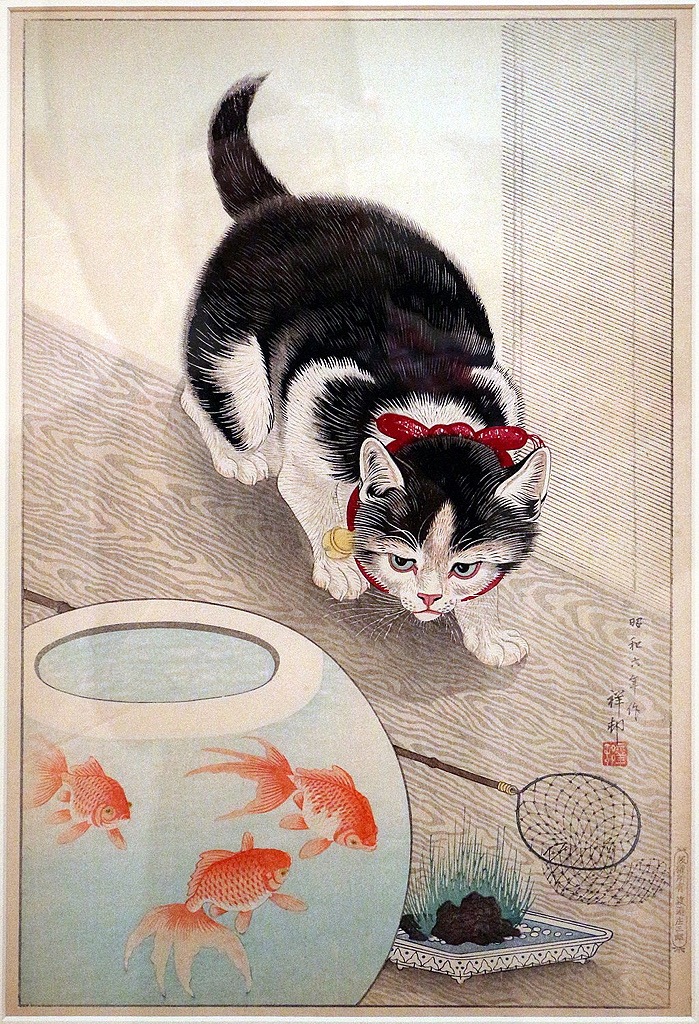
Ohara Koson: Cat and Bowl of Goldfish (1933)
"We didn't find home lurking there, either …"
Though I lived almost half of my life in this SouthEast Portland, Oregon neighborhood, I always felt afraid here. When my first wife and I arrived in late 1975, fresh from a couple of years living in a small city in Northeastern Pennsylvania, Portland seemed huge and threatening. We found a small apartment on a major thoroughfare, just across the street from a massage parlor and on a major bus route, and settled in as if surrounded by an unseen but ever-present enemy. My wife's parents had lived in a tiny garden apartment just around the corner when they were first starting out, so I suppose that we might have found some sense of home here, but we never did. It didn't help that my wife had taken a job in a hospital that she didn't like or that I was trying to break into an unfamiliar music scene. I then still fancied myself a single acoustic performing artist. I was good at what I did, but disco threatened. I was teetering on the decision to enroll in the local state university and get out of the business, working casual labor jobs in the warehouses surrounding our apartment. I let go of a defining dream in this neighborhood.
I return now because my son and grandkids live in essentially the same neighborhood, a dozen or so blocks from that first apartment, in an apartment of their own.
Humpty

Ohara Koson: Two White Geese (Japanese, Meiji era, beginning of 20th century)
" … stripping out soft brass screw heads and struggling with heavy things."
Humpty Dumpty sat on a wall.
Humpty Dumpty had a great fall.
All the kings horses and all the kings men
Couldn't put Humpty together again.
-Traditional Nursery Rhyme
The Villa Vatta Schmaltz seems to be experiencing a bout of Humpty as The Muse and I try to put The Villa back together again.
CatchingShadows

Ohara Koson: Six Geese and Shadows (1926)
"Slowing down and showing up …"
I seemed somehow primed to anticipate that The Law of Unintended Consequences would tend toward rolling snake eyes, the worst possible outcomes, but Our Grand Refurbish has produced more counter examples than supportive ones. On samples, The Muse's choice of color seemed unremarkable, perhaps bordering on regrettable, being a shade of grey, for cripes sake, but in practice, it became a chameleon color, capable of surprising variations depending upon even small changes in light and shadow. Rather than drab grey walls, The Villa now has vibrant technicolor ones, each corner marking at least a subtle shift in color or texture, each angle shifting the nature of each room. It's all more than a little bit overwhelming, for the rooms seem to be in continual motion. Leave a room and it will have changed by the time you return. Step into a room and some subtle or significant shift might imprint. The place seems to have grown at least one additional dimension.
I'm most impressed with the Villa's new proclivity for CatchingShadows.
GooseChasing

Ohara Koson: Two white geese swimming by reeds (1928)
"I'd chase more geese any time it's possible."
Near the end, usually, an opportunity appears to turn tedious ladders into rapidly accelerating chutes, an apparent shortcut appears. Of course, by long tradition, most anyone would grab this opportunity like the lure it most certainly seems, rubber worm and all. Even I, experienced refurbisher now, fell prey to this call. Our carpenter had located the material he needed to refurbish the long window seat and shelves in our soon-to-be showcase library. Those boards were in Portland, 245 miles away, and the supplier couldn't say if FexEx® would even consent to ship the stuff. I volunteered to drive over and back to collect the boards, insisting that they be no longer than five feet so that they'd fit into The Schooner. Joel Our Carpenter missed the confirming call and by the time he'd caught up to it, the outlet had closed for the day. That was Wednesday.
We parted that evening with the understanding that Joel would call me just as soon as he'd confirmed that the order was ready.
Adopting
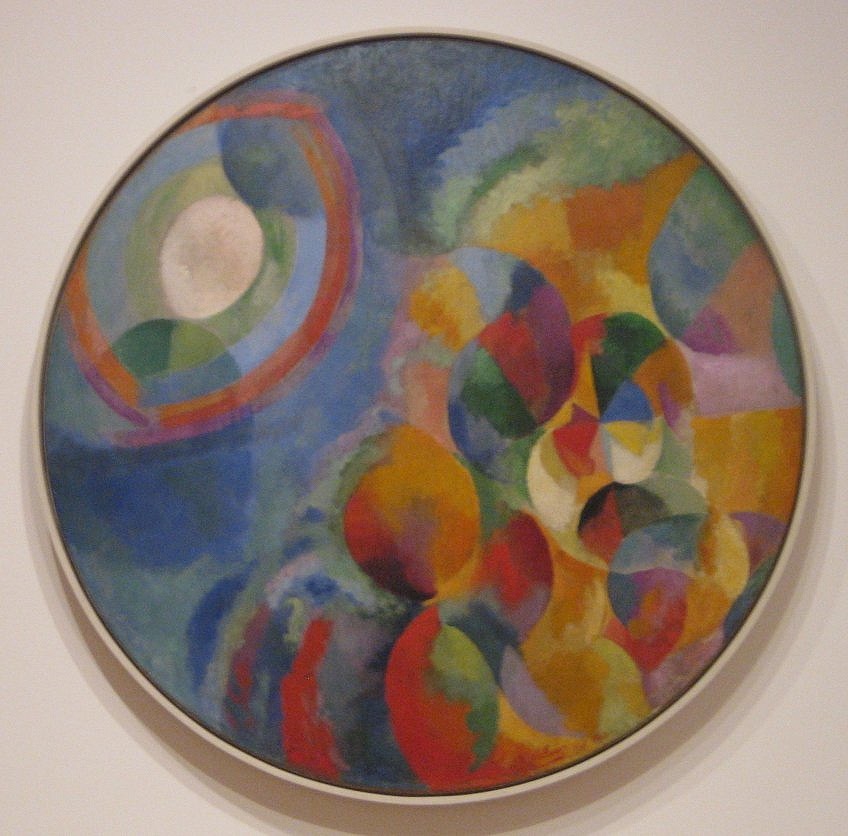
Robert Delaunay: Simultaneous Contrasts: Sun and Moon (1912–13)
" … will we regale them of stories of what was once there but is there no longer?"
The Muse and my relationship with our beloved Villa Vatta Schmaltz does not very much resemble a marriage, marked as it has been by extended absences. Nor does it look very much like a birth family deal. We do not share DNA. Our life here more closely favors Adopting, for we've taken this place into our family and, or so it also seems, this place has been steadily Adopting us. It's a curious relationship in that The Muse and I have been largely focused upon improving this place since we first moved in, and pursuing improvements might be hints that we're criticizing our adopted family member. I think my second wife and I got hitched on the prospect of who we might become together, but the differences between what we were and what we might improve into got us before we could arrive at our destination together. There's something genuinely poisonous about focusing upon achieving future improvements. Nothing turns off the present and no future directly influences anything before it, though the sense that we're not quite there yet can tear asunder even the truer loves. We are always here yet and never quite there yet.
That said, we love this place as if it were family.
Spurt
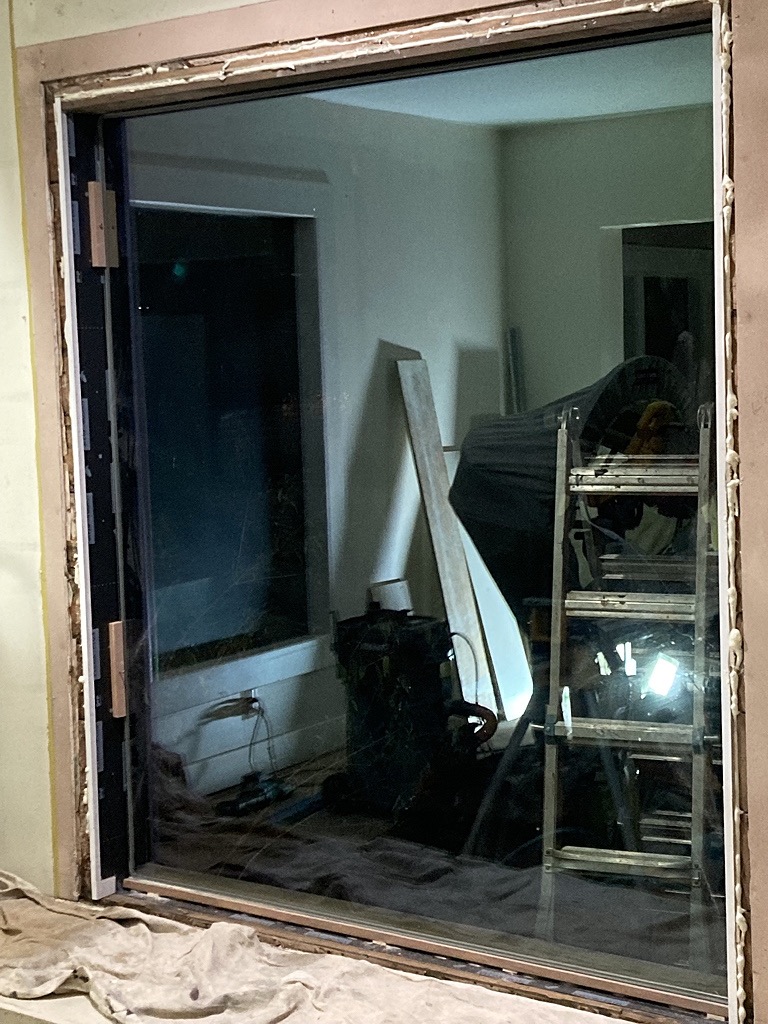
Reflection in freshly-installed front window in The Villa Vatta Schmaltz
"I'm inhabiting what was then just aspiration …"
Wasn't it just yesterday morning that I complained about The Grand Refurbish moving forward in slow motion? By noon, I found myself struggling to keep up with a pace I had not anticipated reappearing. This experience served as another reminder that time, contrary to popular misconceptions, does not move in any consistently regular fashion. It moves by Spurt and stall, by fits and starts. Clocks apparently more or less accurately track an average rate of time's expansion, a smoothed representation of a much more chaotic phenomenon. Clocks inexorably misrepresent actual experience and easily influence anticipation. When time seems to move slowly, which it sometimes does, it seems as though it might forever thereafter continue so moving, never any faster. When time whizzes by, as it also sometimes seems to, who takes the time to consider that the apparent velocity of time probably amounts to an illusion? You could be sitting right beside me and we could be experiencing time completely differently without ever noticing how our individual experiences differed.
It should be no surprise that Our Grand Refurbish still carries a surprise or two inside her.
Disarray
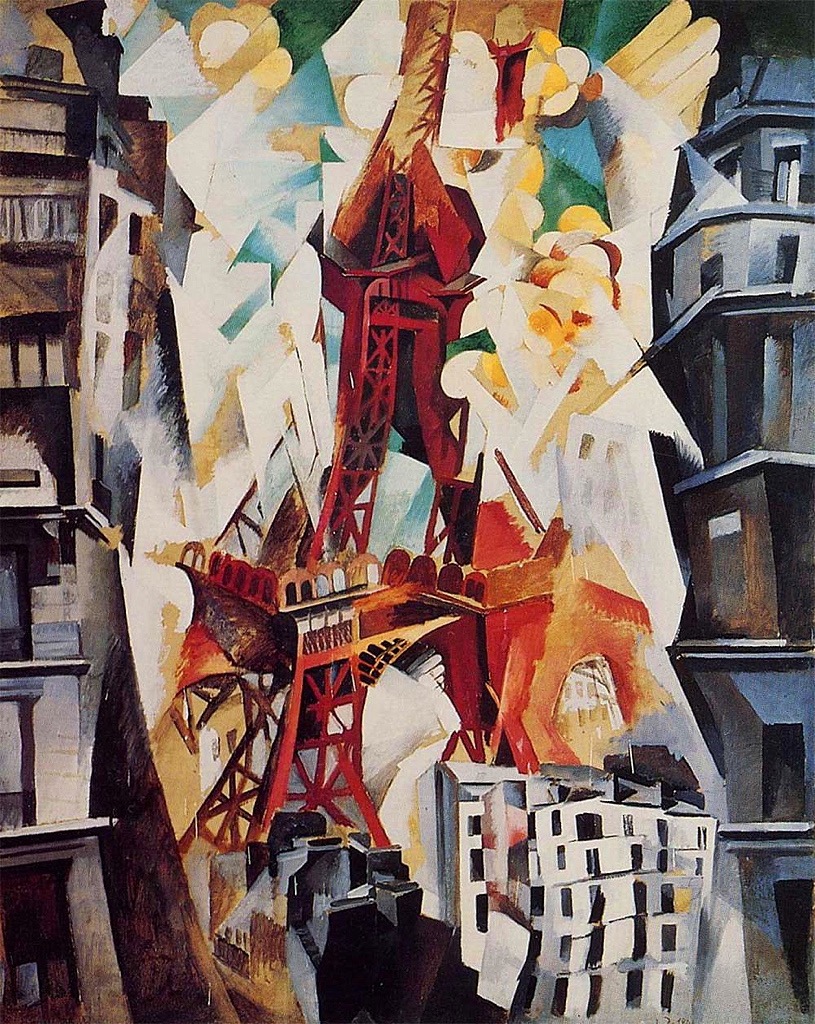
Robert Delaunay: Champs de Mars: La Tour Rouge (1911)
"We might never finish, but we're real close to done …"
I can tell that The Grand Refurbish nears completion because the house seems in ever greater Disarray. I'd imagined that as we finished rooms and even started re-inhabiting them, that the clutter might recede. Certainly, the second floor now holds only traces of the messes that dominated there for weeks and weeks, but as the effort has concentrated on the final two rooms, the materiel necessary to affect the remaining changes have been crammed into an even smaller space. I'm forever tripping over something and have taken to avoiding the workrooms unless its before or after the work day. The painter needs his space as does the carpenter, and I can do whatever I need to do in there off hours, though most of what I do in there amounts to tripping over something or tidying up, even though I know for certain that the surest way to increase the net sense of disarray involves somebody tidying up for somebody else, especially if its done without first seeking advice, counsel, or permission. The living room and library are currently in such disarray that they disturb me. I feel moved to nap through the balance of this effort. Wake me when the clutter's gone. I have no stomach for it.
Last week, The Muse cleaned up a mess I'd made by creating one of her own.
Taping
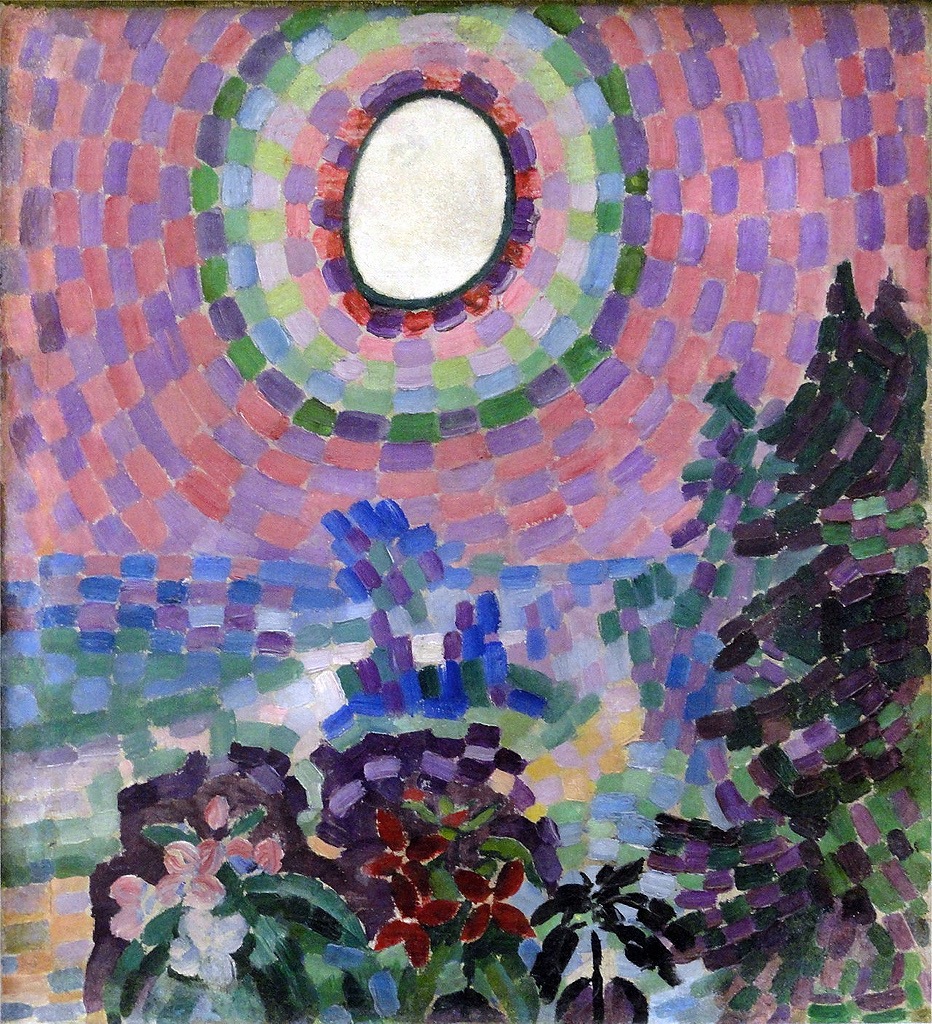
Robert Delaunay: Paysage au disque (1906–07)
" … a final fit of preparation before the legacy begins."
I noticed as I was finishing applying the first coat of paint on our newly installed living room window's exterior, that I had spent more time preparing to paint the window than I had spent painting the window. This tends to be the case with most home improvement activities, yet I don't usually focus very much attention on the preparation, more often perceiving it as a distraction from the real operation rather than the lion's share of it. Like many, I suspect, I don't have much stomach for prep work. It often seems tedious. It produces little lasting effect, its chief benefit being what it lends to the final result, but it leaves few if any footprints. It's enduring value falls under The Dog That Didn't Bark category and gets lost in rounding.
Yesterday, i was Taping the window trim I was intending to paint, this to reduce the likelihood that I'd slop the paint color where I didn't want it.
NotNoing
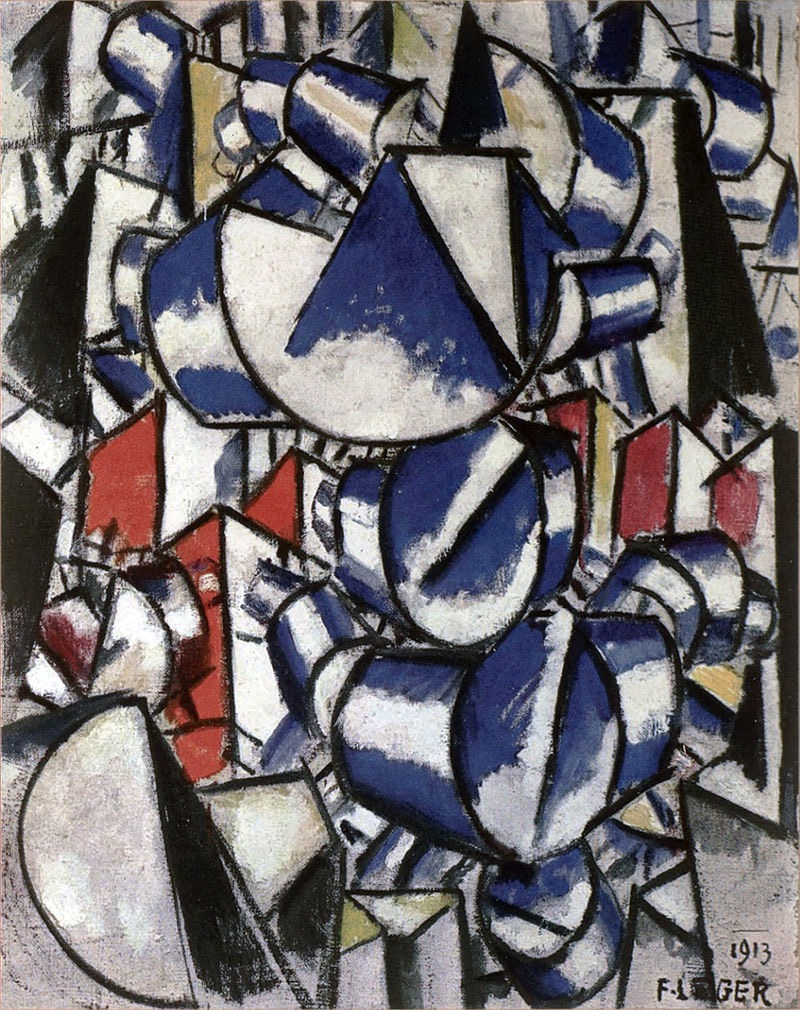
Fernand Léger: Contrast of Forms (Contraste de formes) (1913)
"I'm uncertain if anyone can ever outgrow that stance."
I want to speak this morning about an increasingly common situation, a form of deliberate misapprehension wherein people seek, often with considerable passion, information they might otherwise reasonably suspect isn't true, either due to its source or its form. This information often seems overly convenient, perfectly satisfying an expectation long accustomed to disappointment. It might come from a source long-acknowledged as unreliable or partisan, someone with the reputation of saying anything that might rile someone. The effect of such a transmission, deliberate misapprehension in and self-destruction out, seems perfectly represented in the vaccine deniers proudly standing up for their superior understanding and patriotism. Their position doesn't quite seem stupid, but more intentional than that. It mostly appears belligerent but without clear purpose. The self-satisfied expressions these possessors of negative knowledge display leaves me feeling 'sore afraid.'
This position seems the sole of Homemade.
Hearth
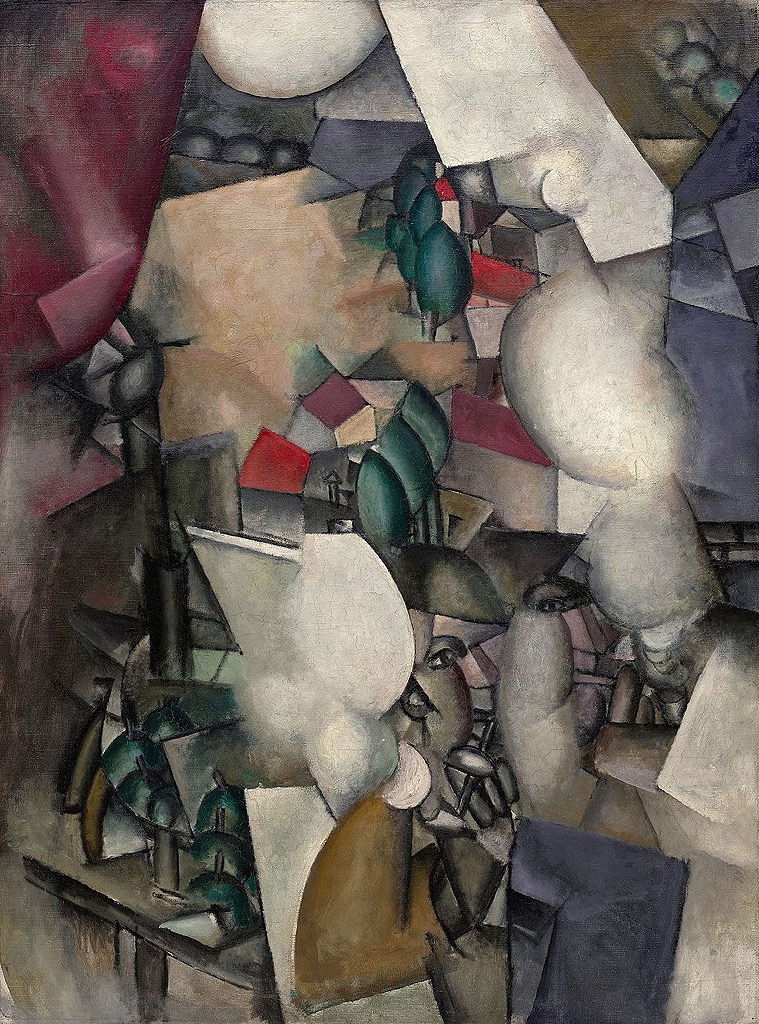
Fernand Léger: Les Fumeurs [The Smokers] (1911–1912)
" … a naked Hearth can no more stand than can a naked heart."
Determining the center of anything can pose a difficult dilemma. Like determining best, insufficient information often exists to declare any definitive answer.—(Huh? How could insufficient information exist? Sufficient information doesn't exist. A surfeit of insufficient information couldn't exist, but then it's a negative quantity, so I guess it gets counted differently.)—Further, one might declare centers for a variety of attributes or elements. An emotional center need not resemble a physical or intellectual one. At some level, I suspect that every element might be reasonably declared the center of something, if only a temporary center of attention before consideration passes. I bring up this question because it's come up within our Grand Refurbishment. Our color palette first held central attention. Then, door and window trims. The banister rightfully held that space for a spell. So did the stairs. Now, the living room windows and the cleverly designed library wall, but each foci in turn slipped back into an other than central position as the refurbishing machine rolled on. As it nears its destination, one glaring element remains unaddressed, though not unconsidered: The Hearth.
If any element of any house can rightfully be considered its center, I suspect that the Hearth usually holds that position, if only due to the sense that Hearth IS home and thereby irreplaceable.
Removals
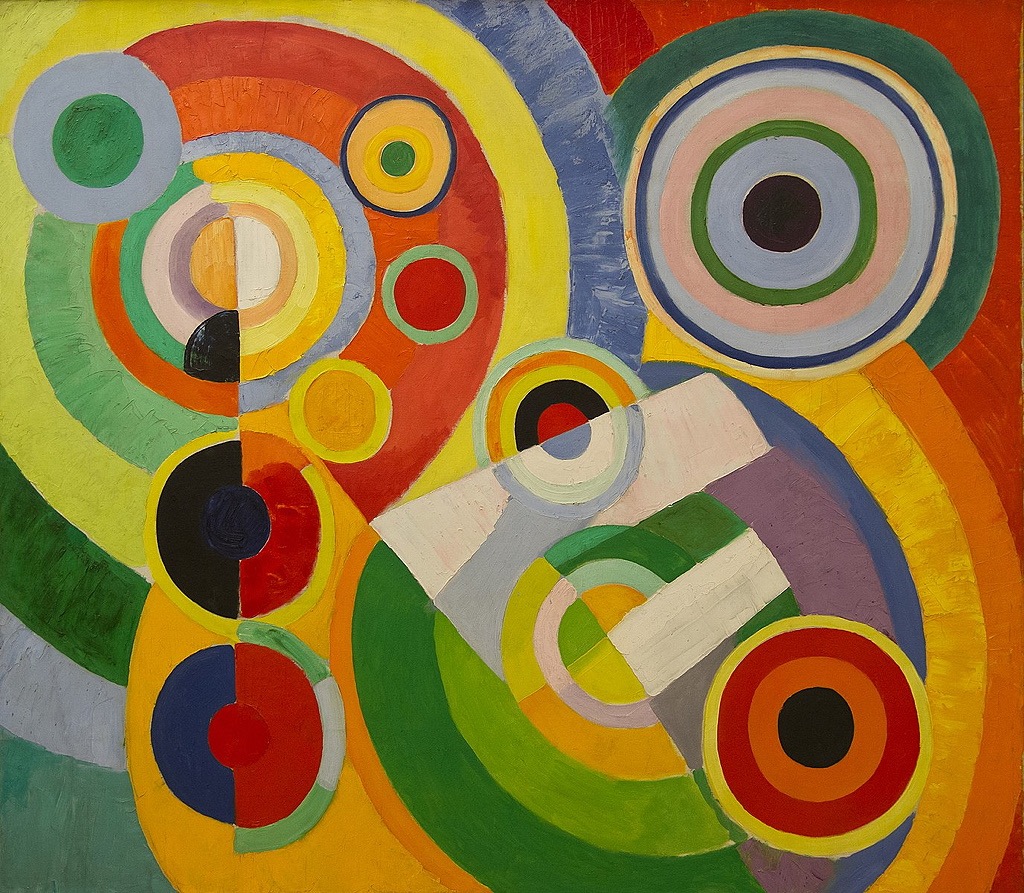
Robert Delaunay: Rhythm, Joie de vivre (1930)
" … indistinguishable from madness and joy."
I believe that we've already established that destroying's more entertaining than creating and that some work seems better suited for kids, or at least the kid inside. While Refurbishing might seem a net creative act, one must sort of blank the palette before painting, and much of the prep work comes in the inherently satisfying Making Waste category, by way of Removals. None have proven half as satisfying as removing wallpaper, though, for wallpaper mostly exists as a criminal enterprise. Often hung in lieu of fixing the underlying wall, it hides deep dark secrets, albeit poorly, thereby keeping them alive. The one who chose the wall covering might have once upon a time been satisfied with their choice, but they long ago passed on, leaving their handiwork behind which aged just as poorly as they did, yet it's still on display. In our old place, some mid-seventies remodel, we figure, left the music room/library bordered with a gilded paisley burgundy specimen, the garish out-of-placeness of which, we once sort of reveled in. The time had come to take that down.
I tried reasoning with the stuff, spraying it with warmish water and adding patience, but it would not release its grasp.
Odds&Infinities
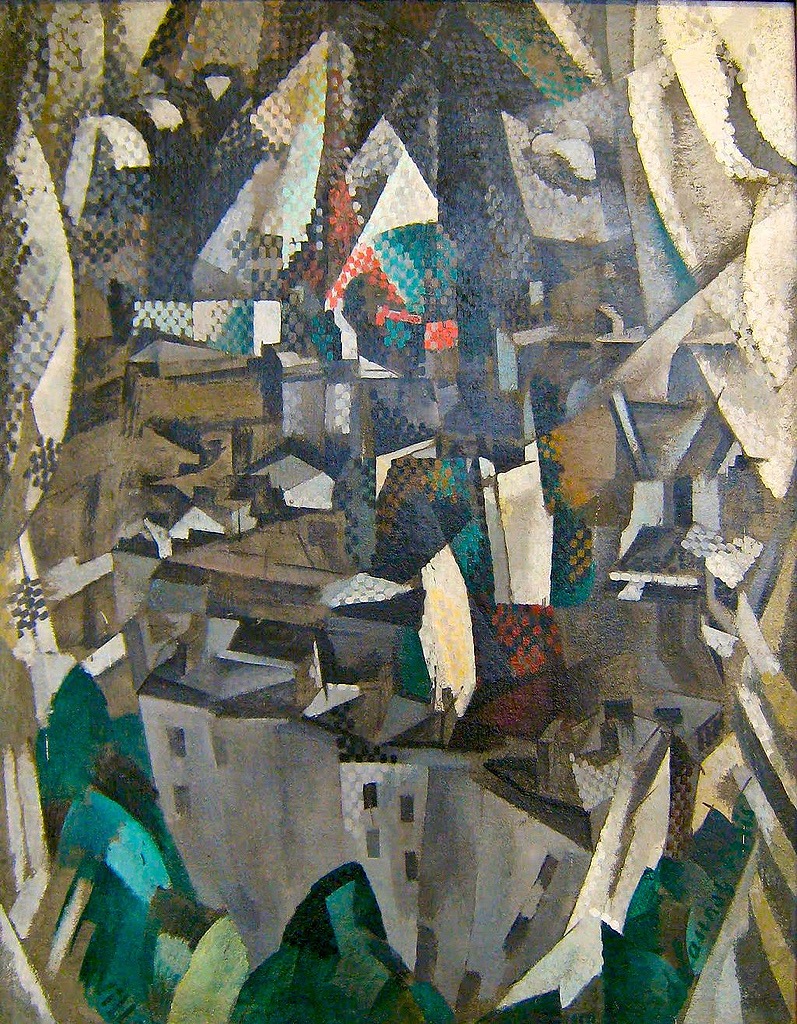
Robert Delaunay: La ville no. 2 (1910–11)
"I leave muddy footprints wherever I walk."
The Grand Refurbish has resolved itself into two contiguous rooms. The upstairs will be complete later this morning, save for a few what might be called odds and ends but which I suspect some of which will very likely become Odds&Infinities, as we'll likely never fully resolve them. I've got that rebuilt door with the odd latch inset which could use some additional carving out but seems too thin for chisel work. The Muse's desk, the base of which I broke when disassembling it and needs rebuilt, blocks reinhabiting that whole room and threatens to become an infinity of its own. Our Carpenter Joel breaks new ground but leaves a few small relatively insignificant undone bits in his wake. Nothing huge or noteworthy, small infinities which don't threaten to break anything or anybody, but still sort of wear on me.
My life includes many, many Odds&Infinities.
KindWind
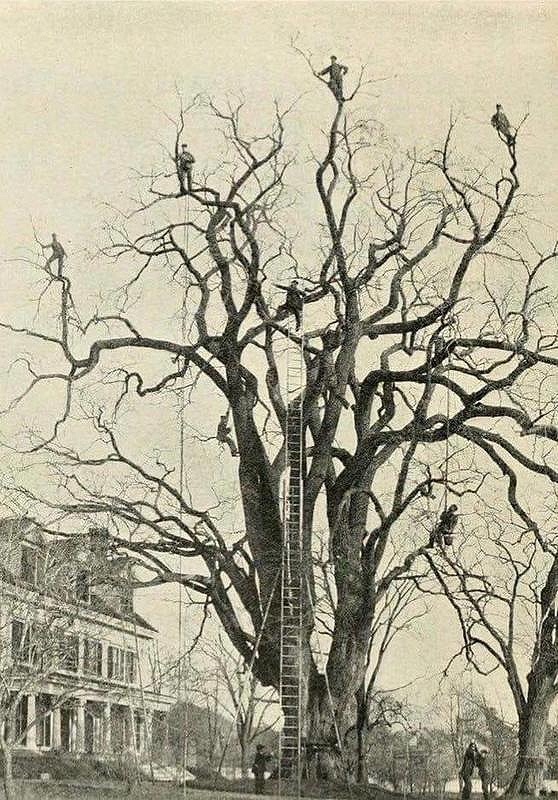
Unattributed photo of tree pruning crew, late 1800s
"… all things seem possible."
By mid-November, Autumn color's had its day. The enormous Maple takes to sporting an embarrassing combover, the crabapples have gone bald, and the sacred apricot has yet to lose a single golden leaf. The snowball bushes and the hydrangeas seem unaffected and the dogwood's apparently indifferent, still almost fully populated with scarlet leaves. The side yard's a shuffler's heaven, and I choose to leave those leaves where they've fallen, the better to overwinter whatever lies beneath them. I was once a fussy gardener, but no more. I pull no production-quality clean-up performance like some of our neighbors put on, like I used to, seemingly chasing down each freshly fallen before it hits the ground. My lawn will sport bare spots whether covered with leaves or not and besides, I've got a secret weapon. If history can still be counted upon, a Kindwind will soon descend and effectively put an end to the autumn leaf problem, which was more of a feature than a problem, anyway.
The Kindwind blows in off the Northern Pacific, bringing strong winds for this valley, sustaining at around twenty-five with greater gusts.
UnBoxing

Unattributed photo of stacks within old Main Branch of the New York City Public Library, pre-1955, now demolished.
" … by the grace of something …"
I had not noticed. How many could provide the same testimony? They hadn't noticed. An absence does not always or even often make itself felt. The hole, having no content, doesn't seem to exist. Empty often defies definition. Name the dog that didn't bark.
I put my books into boxes eight months ago, and there they sat as The Muse and I moved a third of the way across the country.
Scarin'Myself
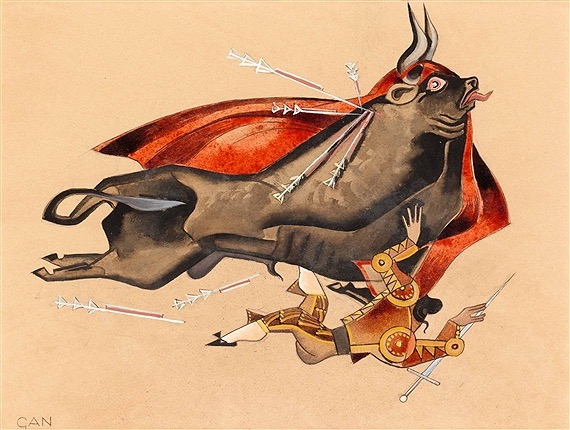
Gosta Adrian-Nilsson: TJURFÄKTNINGS SCEN [Bullfighting Scene] (1934)
" … at least in my own mind …"
I hold the firm belief that it's inherently healthy for me to occasionally scare myself. This amounts to a philosophical position, however, and does not always or even usually translate into me frequently so engaging. I remain a ninny at heart and am apt to fuss over any operation near any edge and that's double for heights, so when I challenged myself to take down the long-standing and little-used scaffolding, it amounted to a big and rare event. I went looking for The Muse to help, but she was impenetrably occupied on a call, so after re-re-re-re-re-thinking one final time, I climbed to the top and started disassembling.
Were it not for the height, scaffolding could be simple, but altitude makes all the difference.
StartingInto
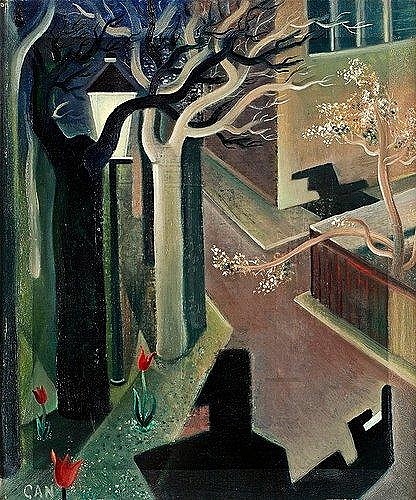
Gosta Adrian-Nilsson: Shadows, twilight (1929)
" … finally coming back into focus."
The Muse insisted upon cleaning up what would become my office. After refurbishing, it was shrouded with a thick patina of dust, first from my removing the ancient wall-to-wall carpeting, then from sanding woodwork, wall, and ceiling patches. The room, before refurbishing and just after, had served as a warehouse for displaced stuff from every other room on the floor, so even the fresh flooring was spattered with spots of spackle, sawdust, and paint. She bravely waded into the mess and I disappeared myself down into the kitchen to set a pot roast braising. I gave her a good hour, perhaps a little less, until after I'd heard both vacuums start and stop and a long silent period probably signifying mopping up. She'd cleared that table I'd used as a catchall during the work and seemed ready for some help shifting stuff. Bookshelves, which I'd stacked on their backs in the middle of the room to facilitate crown moulding and baseboard installation, needed dusting and fresh felt feet. The carpets they laid upon needed rolling and the rest of the room wanted vacuuming, sweeping, and mopping, too. I helped arrange stuff then played scarce again.
I realized that I was not so much moving in to this room, but StartingInto it.
Kittening

Gosta Adrian-Nilsson: Figurer I Trappa (1923)
"I suppose that their feral beginnings serve them well."
Two years ago this week, Max came to live with us. Max was at the time a six month old feral kitten who had been captured, separated from his family, neutered, nurtured through a few common feral diseases, and held in a cage until we arrived to liberate him. He was mildly appreciative, not openly hostile, but very wary. I learned later from the shelter that the man who had captured Max resembled me, so I probably looked like the enemy to him. I set about disconfirming his initial impression of me. He became curious.
A few weeks later, we brought Max's sister Molly home from the same shelter.
OpeningCans
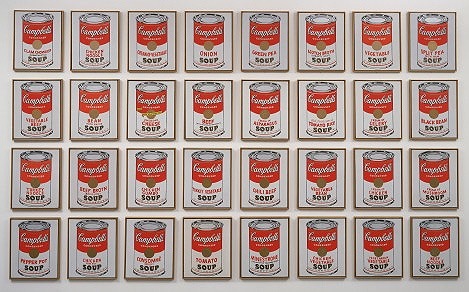
Andy Warhol: Campbell's Soup Cans (1962)
"A pantry in name only."
It occurs to me, finally, that This Grand Refurbish never was about demonstrating any particular wizardry, but about OpeningCans. A can serves as perfect camouflage for whatever's inside it, each uniform and seemingly holding the same contents. One must rely upon faith in labeling or blind habit to determine the contents before opening. The contents never seem quite like I've anticipated. Tuna might show up as a fine filet or as a slurry. Soup definitely needs warming. Peas just need throwing away. What was I thinking? I think OpeningCans serves as an everyday courageous act, one asserting ability, putting something on the line. OpeningCans screams that I've accepted full responsibility for dealing with the contents, whether they be worms or just what I'd imagined.
Our Grand Refurbish has opened so danged many cans that our little crew seems to have at least mastered that act.
Seized
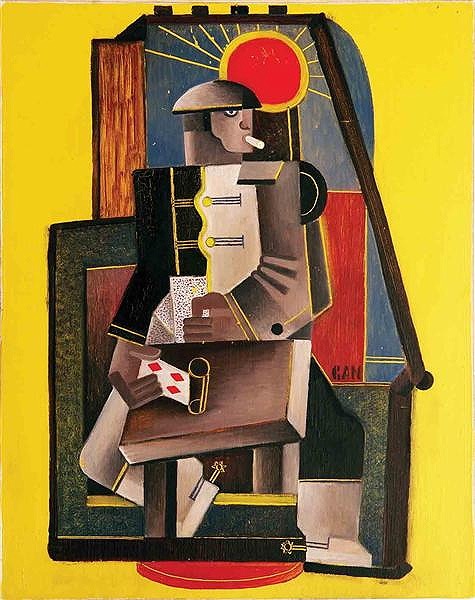
Gosta Adrian-Nilsson: Soldat (1917)
" … identifying now-or-never opportunities that will most certainly extend our efforts even further …"
Our Grand Refurbishment has become an audacious act. Before we began to understand the magnitude of the effort, back when we still held trivializing notions of what it might mean to 'slap on a coat of paint,' the effort seemed only reasonable, and barely that. The place desperately needed patching and painting, and what better opportunity then when we first re-inhabit the place? Then it slowly transformed into a series of 'If Not Now, When? decisions, where, as our understanding improved and expanded, we noticed wasting opportunities presenting themselves. We understood that once the patient was closed up again, she would likely not easily consent to another operation, so, under The As Long As We Have The Hood Open Rule, we expanded the original scope. Kurt Our Painter, who was confident of completing work on the master bedroom this week, instead spent the bulk of his week re-floating two overly patched walls. The result will be rather smoother walls than in any other room, but on perhaps the two least noticeable walls in the place.
We have Seized opportunities as they presented themselves but have also felt Seized by circumstances.
Divisible

Man Ray: Dust Breeding (1920, printed ca. 1967)
" … we're eminently Divisible and we know it!"
Joel Our Carpenter and I were hanging crown moulding when he noticed that his brad nailer was running low on brads. He remarked that he'd left a refill package on a window sill somewhere and wondered if I'd happened upon it. I hadn't. I directed him to the parts table, a now hopelessly overloaded card table I set up out of the way back in the early days of our Great Refurbish, back before it had become a great anything. That card table groans beneath its burden now. It holds every odd otherwise unclassifiable anything that needed a landing place. Paint rollers wrapped in plastic hang from its strut supports, and attempt to trip anyone passing. It's now located on the mainline between the above the front porch deck and the rest of the upstairs, a primary migration route for long crown moulding boards and baseboards headed for remounting. It's an eye of the needle passage and I suppose that every job site needs one of those, a common ground generally abused, reviled and revered in more or less equal measure. A place where we might come together, if only there was room, given the clutter.
Joel could not find his brad magazine on the impenetrable table, so I volunteered to go find him that ammo.
BackTogetherAgain
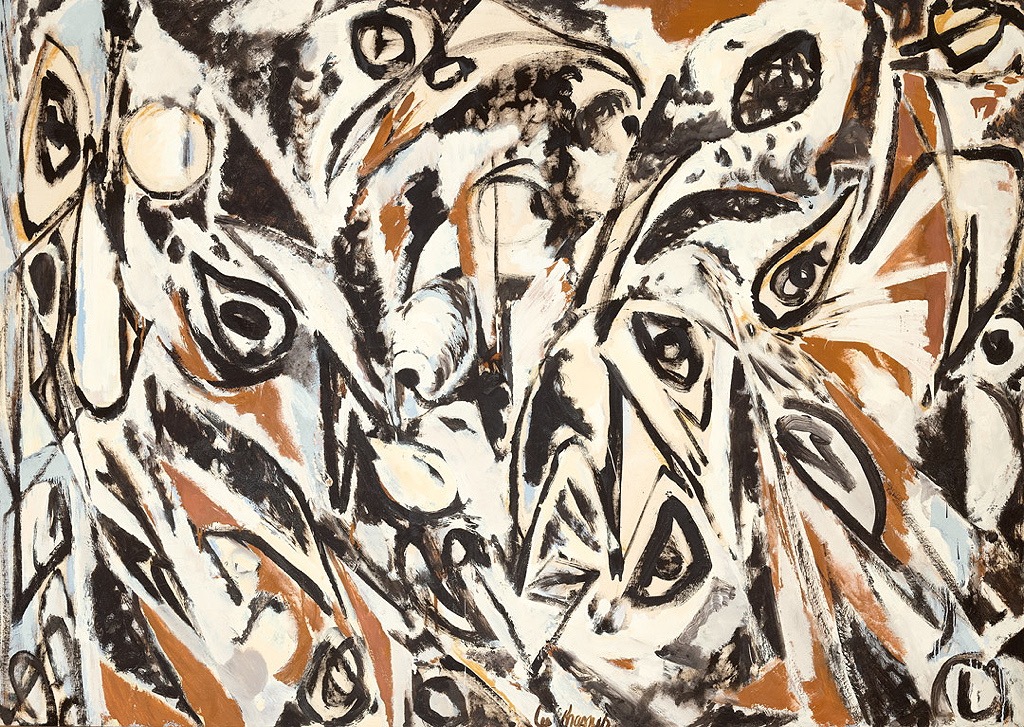
Lee Krasner: NIGHT WATCH (1960)
"Life's open-ended."
Overall, I'd testify that taking stuff apart tends to be much more satisfying than putting stuff BackTogetherAgain. Tearing down satisfies the little boy in me since it hints at destruction. I guess a part of every little boy secretly wants to be The Incredible Hulk and trash the place without recrimination or remorse. Reassembling can be exacting and challenge even the very patient since it holds out the promise of perfection or something like it. It seems too easy to presume an outcome unlikely to be achieved then blame myself for falling short. Taking apart's successful when entropy peaks. BackTogetherAgain might never be achievable.
I say that BackTogetherAgain "might never be achievable" when I know for certain that it's almost always absolutely unachievable, and at all other times, only relatively so.
Schlepping
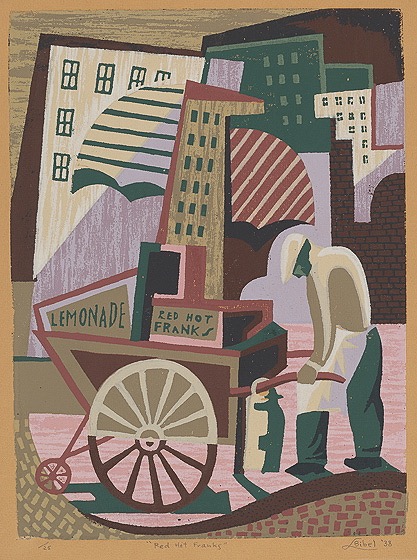
Leon Bibel: Red Hot Franks (1938)
"I sound like a steam locomotive coming."
My hand truck must be the most useful tool I own. I bought it back when I often found myself Schlepping shipping boxes to the post office in preparation for another workshop but I've found uses for it far beyond Schlepping shipping boxes. I use it in the yard, for instance, instead of a wheelbarrow. This move that might never end has daily benefitted from my hand truck's presence, for This Grand Refurbishment might just as easily be called The Grand Schlep, since we seem to have moved everything we own several times since it started and we have not yet seen the end of it. With my hand truck, though, I don't have to lift much to tote a lot, something my back sincerely appreciates. Just yesterday, I moved all my books again, for something like the fourth time since we "moved in" last March. I'll move them at least once more before I'm finally ably to unbox and display them, each move made easier by my ever-present hand truck.
Everything's a Schlep.


